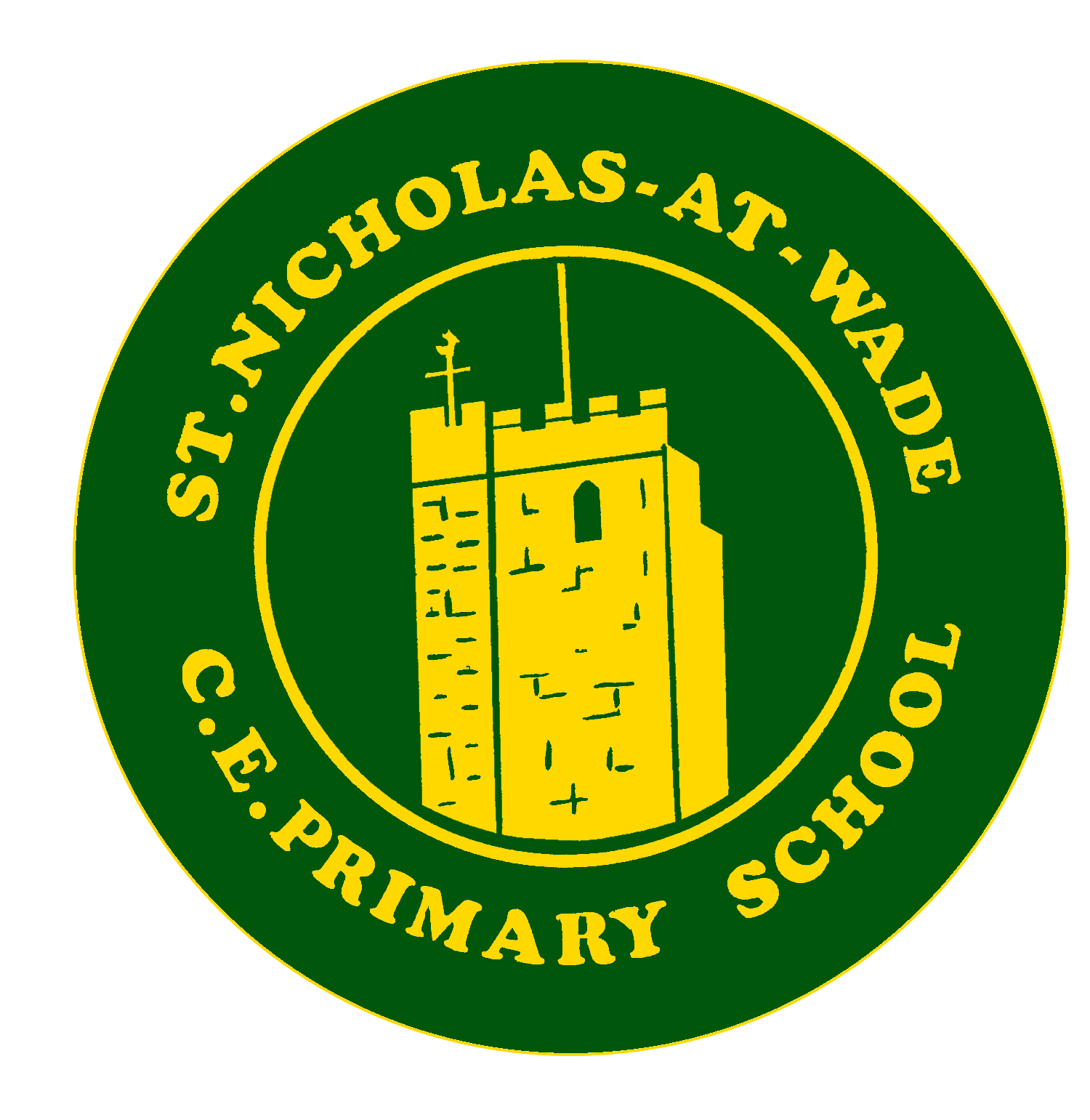|
We start from what the children know, using our strong relationships with parents and carers to ensure we know all we can about each child before they embark on their learning journey with us. We aim to provide creative and memorable learning experiences that lead to high levels of engagement from all.
“Tell me and I may forget, teach me and I may remember, involve me and I will learn.” Benjamin Franklin
At St Nicholas, we aim to provide a curriculum that breaks cycles of disadvantage, opens horizons for all and levels the playing field. Our curriculum supports the development of the whole child, leading to kind and respectful children who are confident, resilient and curious life-long learners. We provide children with a safe learning environment, where highly skilled practitioners support the children to form strong and secure relationships. This leads to children who feel valued and are comfortable taking risks with their learning.
|
As outlined in the EYFS Framework 2022, “Every child deserves the best possible start in life and the support that enables them to fulfil their potential. Children develop quickly in the early years and a child’s experiences between birth and age five have a major impact on their future life chances.”
We adhere to the Statutory Framework for the EYFS and the four guiding principles that shape practice within Early Years settings.
- Every child is a unique child, who is constantly learning and can be resilient, capable, confident and self-assured
- Children learn to be strong and independent through positive relationships with teaching
- Children learn and develop well in enabling environments and support from adults, in which their experiences respond to their individual needs and there is a strong partnership between practitioners and parents and/or carers over a period of time
- Children develop and learn in different ways and at different rates
|
|
By the end of the Reception year, our intent is to ensure that all children make better than expected progress from their starting points and are equipped with the skills and knowledge they need to have a smooth transition into Year 1.
Implementation
The ‘Statuary framework for the early years foundation stage’ and ‘Development Matters’ have been used as a planning framework to structure the build-up of skills and knowledge progressively throughout the Reception year at St Nicholas at Wade CE Primary School. From this, teachers will design medium term plans, which will guide the children’s learning journey. When planning teachers will take into account their knowledge of the children, the children’s interests and their next steps. Skeletal medium term plans have been created by the EYFS team at St Nicholas however, as young children’s learning is often driven by their interests, plans will remain extremely flexible.
|
|
There are seven areas of learning and development, which shape the education and experiences for children in Reception.
Three areas are particularly crucial for igniting children's curiosity and enthusiasm for learning, and for building their capacity to learn, form relationships and thrive.
These three areas are the prime areas:
- Communication and Language (Listening, Attention and Understanding & Speaking)
- Physical Development (Gross Motor Skills & Fine Motor Skills)
- Personal, Social and Emotional Development (Self-Regulation, Managing Self & Building Relationships)
Communication and Language
|
The development of spoken language underpins all seven areas of learning in the EYFS. The importance of language development is widely acknowledged and is a key indicator of future success in life, academically, emotionally and socially. It is vitally important that we provide children with a language rich environment, in which they can develop their listening and attention, receptive and expressive language skills. We also recognise that it is vital that we provide early intervention for any children entering reception with any speech and language delay. At St Nicholas, we provide a language rich curriculum in a number of ways. Firstly, our environment is word and book rich, we read with and to the children frequently. We engage them in stories, rhymes, poems, songs, non-fiction and we set up our environment in a way that gives them opportunity to embed these new words in a variety of contexts. Secondly, we have highly skilled staff in our classrooms. Our staff also receive regular training to ensure high quality interactions and conversations happen, with adults commenting and echoing back what children are doing reinforcing and adding new vocabulary. Our reception team have staff trained in Little Wandle Reading sessions.
|
Additionally, we run daily ‘Drawing Club’. These are carefully planned book sharing activities led by our experienced staff to give children opportunities to practise the speaking and listening skills they need. This develops their language repertoire by modelling it within an engaging context. Finally, we run an extremely effective early intervention program. All children are screened by our specially trained speech and language Teaching Assistant, using the Language Link Screener. This identifies those children with a speech or language delay. Depending on their need children will then receive, 1 to 1 or small group support using the language program that is best suited to them. In doing all of the above, we aim to ensure children leave Reception with the confidence and ability to use a rich range of vocabulary and language structures.
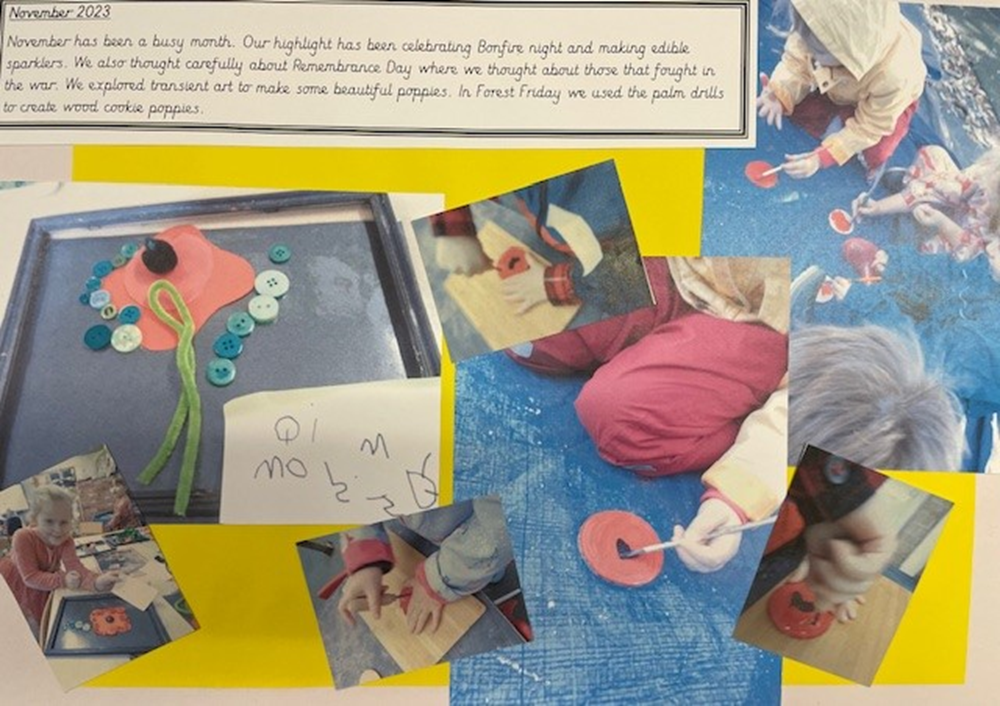
Personal, Social and Emotional Development (PSED)
Children’s personal, social and emotional development is crucial for them to lead happy and healthy lives, and is fundamental to their cognitive development. At St Nicholas at Wade CE we have a values led curriculum, through which children learn to build and manage healthy relationships, understand and regulate their emotions, develop a sense of what makes them unique and celebrate the similarities and differences between us all. Each term will begin with a week of values based learning. The schools values are, Courage, Resilience, Honesty, Kindness and Being the Best you can be. Within our Heartsmart sessions we will use stories, circle time and learning about people from our past to explore these values and how they relate to ourselves and our own lives. We have look at ‘Healthy Relationships’ during which we explore friendship and kindness and what to do if a relationship is becoming unhealthy. In this, we explore our likes, dislikes and abilities. We learn about our classmates and their families and celebrate what makes each of us unique. In order to help children understand their emotions and begin to be able to regulate them, we use the ‘Zones of Regulation’ framework. This teaches children to be aware of their emotions and internal state and supports them in developing strategies to regulate them. In doing this we, teach children about their own well-being and introduce them to mindful activities such as yoga to help them feel relaxed and positive.
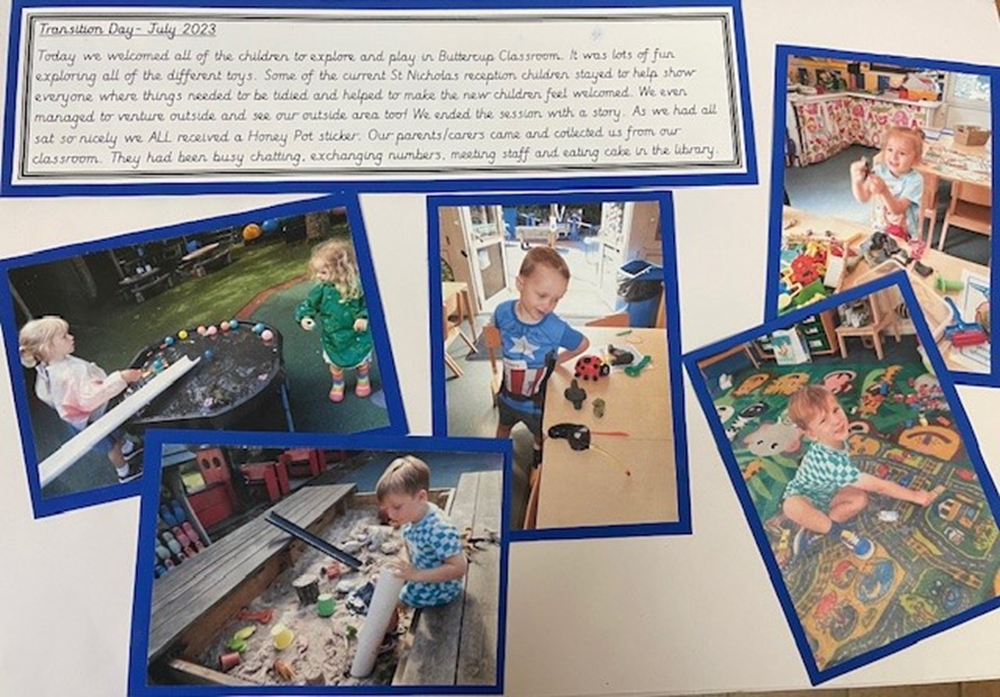
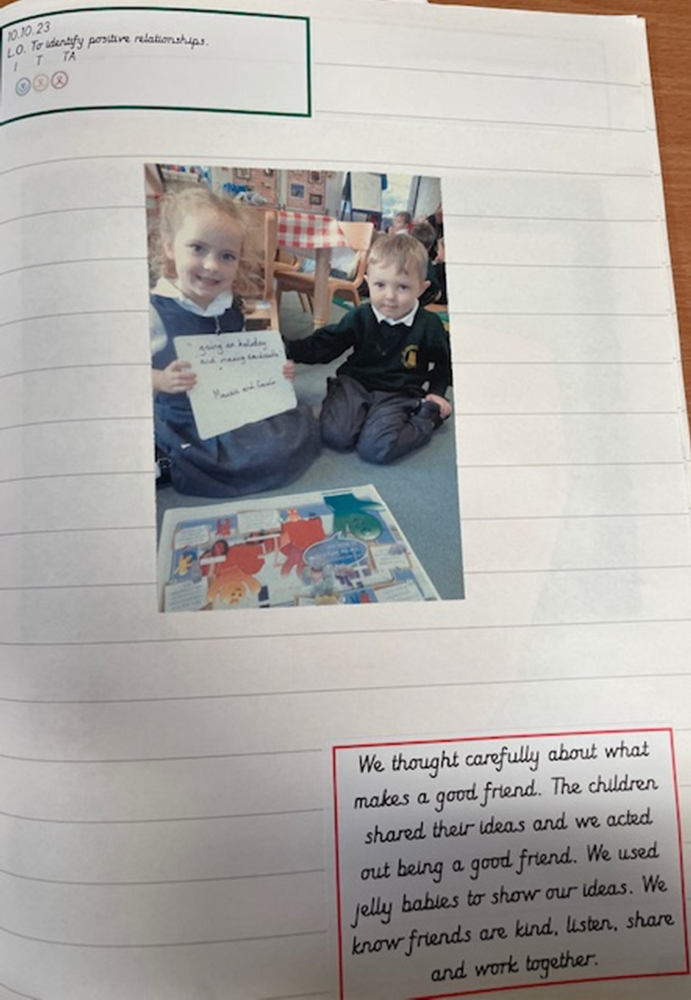
Physical Development
|
Physical activity is vital in children’s all-round development, enabling them to pursue happy, healthy and active lives. We have teacher-led gross motor and fine motor time daily, gross and fine motor activities available during child-initiated play as well as weekly Physical Education sessions. Gross and fine motor skills develop incrementally throughout childhood. We structure our gross motor skills throughout the year to ensure children have the key opportunities needed to develop their core strength, stability, balance, spatial awareness, co-ordination and agility. In line, with this we use the Clever Hands program to support children with their fine motor control and precision. These sessions will lead to pencil and scissor control activities later on in the year once the children’s physical development is ready for this.
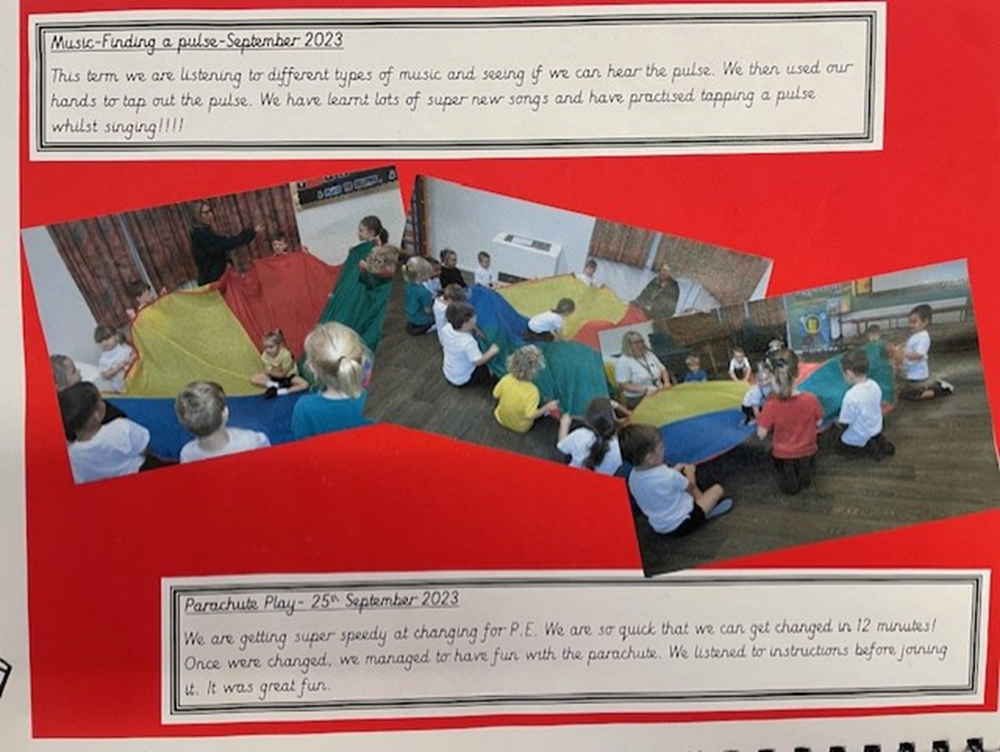 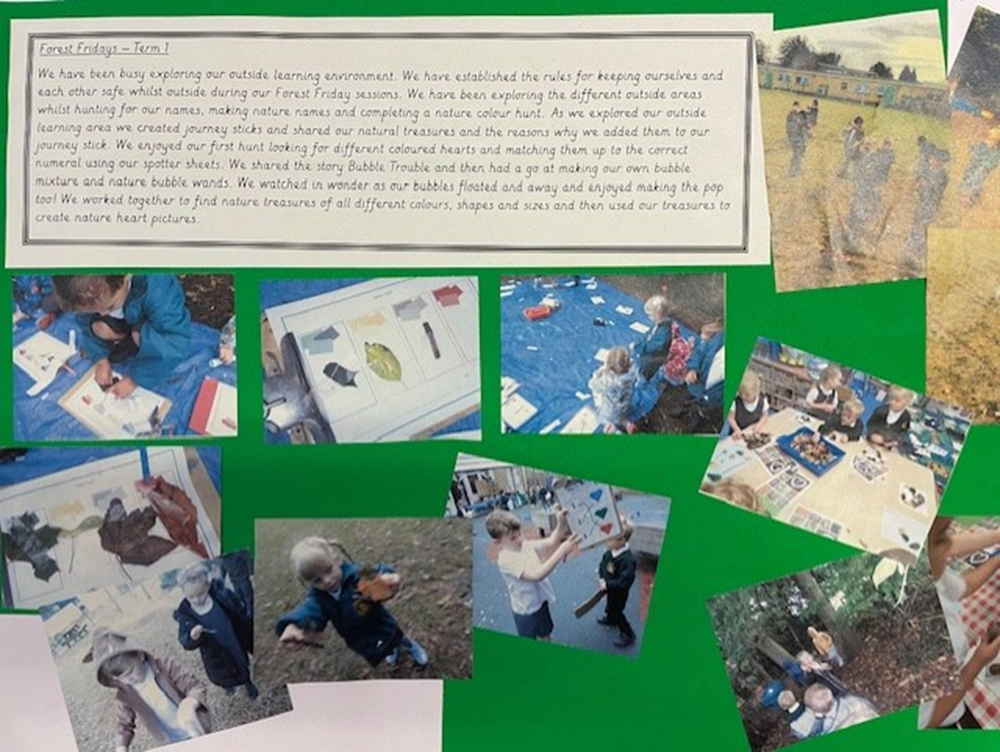
Each week the children have an outdoor learning session “Forest Friday” where they develop knowledge and skills when using tools. They recognise the importance of fire safety. Throughout the year, children will also learn about healthy lifestyle choices and the effect staying active and making healthy choices can have of their well-being.
|
Children are also supported through the four specific areas, through which the three prime areas are strengthened and applied.
The specific areas are:
- Literacy (Comprehension, Word Reading & Writing)
- Mathematics (Number & Numerical Patterns)
- Understanding the World (Past and Present, People, Culture and Communities & The Natural World)
- Expressive Arts and Design (Creating with Materials & Being Imaginative and Expressive)
Literacy
It is crucial for children to develop a life-long love of reading. At St Nicholas CE Primary School, we pride ourselves on having a book rich environment, within which children are read stories, poems, rhymes and non-fiction regularly. Each classroom has an inviting book corner where adults and children spend time together sharing books. In addition, we set up our environment to encourage children to mark make in their play both inside and outside. Each month we receive an exciting delivery of current texts from a local book shop. These are shared at home with a little book box and pack so that parents can share and enjoy these with their child. Alongside, fostering a love and will to read and write, our staff use the Little Wandle program to give children the phonic skills they need to become confident readers and writers. During the first two terms, we will teach children their set one sounds. They will play oral blending games and begin to learn to form their letters. Children will begin to be able to read and write simple words. Moving forwards, children will learn their set two digraphs and will move onto reading and writing short sentences. We offer a keep up, not catch up approach, meaning we conduct regular assessment of children’s phonic skills and offer immediate “Keep up and catch up” where needed. We aim to ensure that no child is left behind. To complement our phonics program, we use engaging and exciting ‘Talk for Writing Text” which we orally rehearse and use to develop our Literacy skills. During these times, children will learn to discuss texts, predict endings, act out and sequence stories and discuss the characters and settings from the stories. They will also get the opportunity to write creatively during this time.
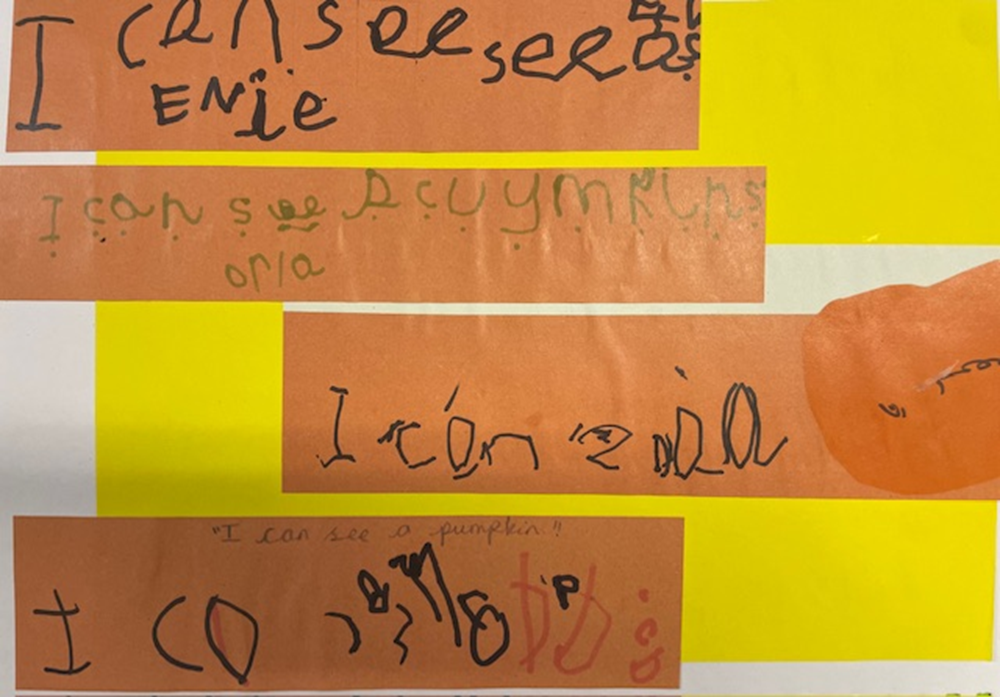 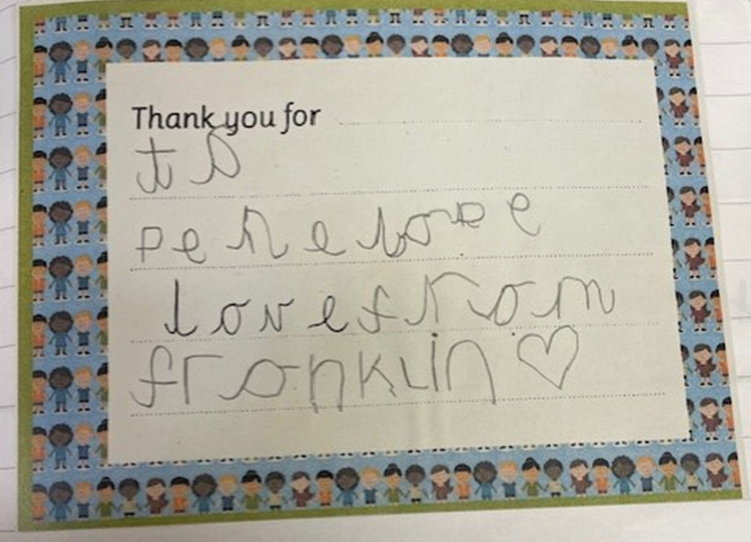
|
|
Mathematics
Developing a strong grounding in number, shape, space and measure is essential, so that all children develop the necessary building blocks to excel mathematically. In reception, we use our environment to aim to develop positive attitudes and interest in mathematics. We provide natural and engaging resources and activities to encourage counting, comparison of quantities, exploration of patterns, space and shape and most of all discussion between pupils and adults surrounding mathematical concepts and using mathematical vocabulary. With the support of the White Rose Maths program, we provide a carefully planned out curriculum that offers children with the opportunities they need to develop a deep, long term, secure and adaptable understanding of the subject. New concepts are taught in small steps and pupils are given opportunities to apply their newly acquired knowledge and vocabulary through play. Staff know each child’s next steps and are trained to extend pupils knowledge and vocabulary during child initiated play. Pupils who are finding it hard to understand new concepts are offered quick and effective interventions in order to ensure no child is left behind.
Understanding of the world
Understanding of the world involves guiding children to make sense of their physical world and community. We plan our Topics based on what the children are interested in. Each Topic will have an entry and exit point and during these, we aim to provide the children with a wide range of personal experiences that increase their knowledge of the world around them. These include exploring our local parks and beaches, meeting important people from our local community, for example, fire-fighters and nurses, having hands on experiences with wildlife, including visits from minibeasts and farm animals and planting and growing our own plants and food. We learn about past events from our own and others’ lives, as well as learning about what life is like in other parts of the world. The children love to learn about other cultures and religions, studying Topics, such as Chinese New Year, Diwali and Easter around the world. Each week the children have an outdoor learning session “Forest Friday” where they develop a love & respect for nature, experience changes that occur within the environment and develop key knowledge and skills. Through this they learn to truly value what diversity across the world brings. Carefully planned activities during child-initiated play also allows children to explore the environment around them.
Educational visits within the local community and further afield are also planned to support the children’s learning within the classroom. At the end of a topic children plan and execute their learning to the parents, inviting them in to share their learning experiences.
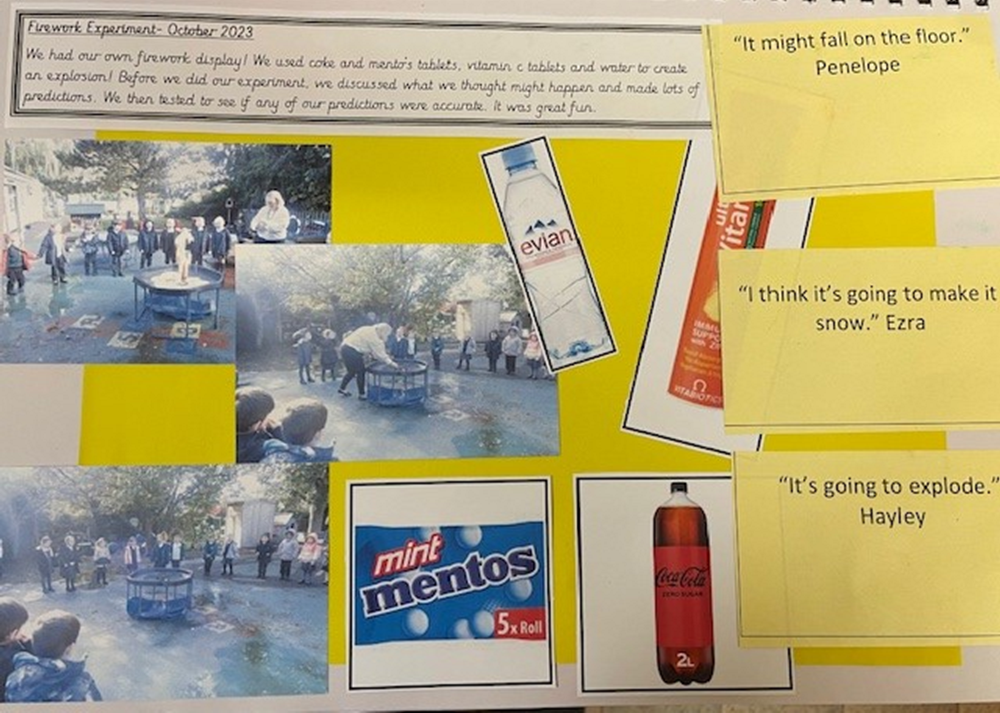 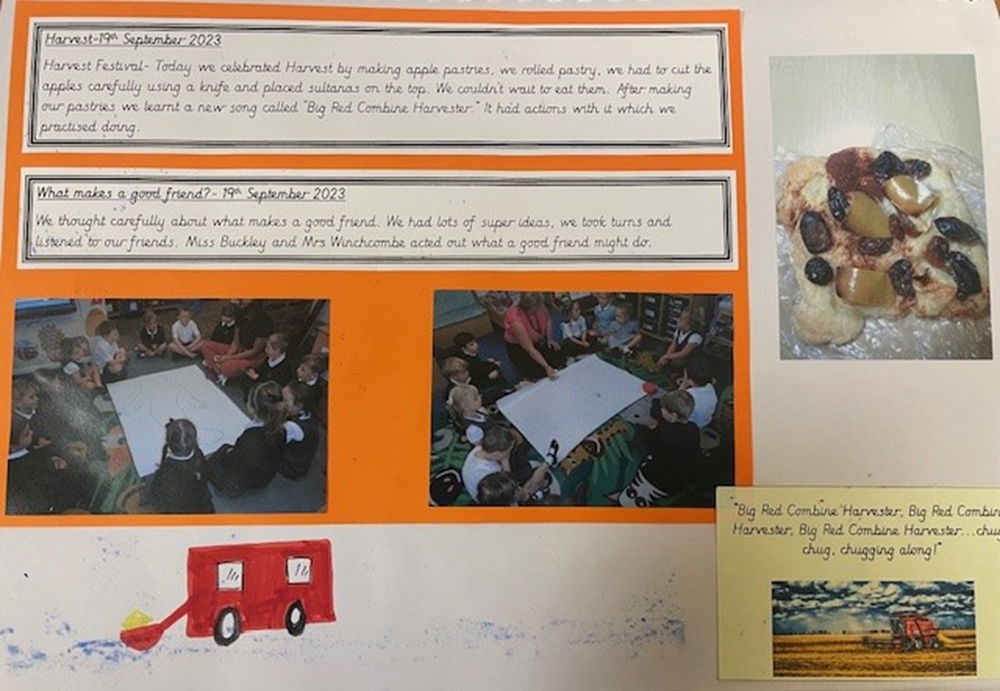
Expressive Arts and Design
|
The development of children’s artistic and cultural awareness supports their imagination and creativity. Through our curriculum we offer children opportunities to explore and play with a variety of media, materials, tools and model a range of techniques. We encourage them to experiment with colour, design and texture and to go back to what they have created to see if they can improve it. The children will have one dedicated music session a week. This will be followed up in class with opportunities to create dance sequences, compositions and perform songs and rhymes. Role-play plays a huge part in supporting children’s’ creative, language and social development. Children are provided with props and materials to encourage and support role-play both inside and outside of the classroom. Adults know when to join in and when to stand back in order to allow the play to develop naturally.
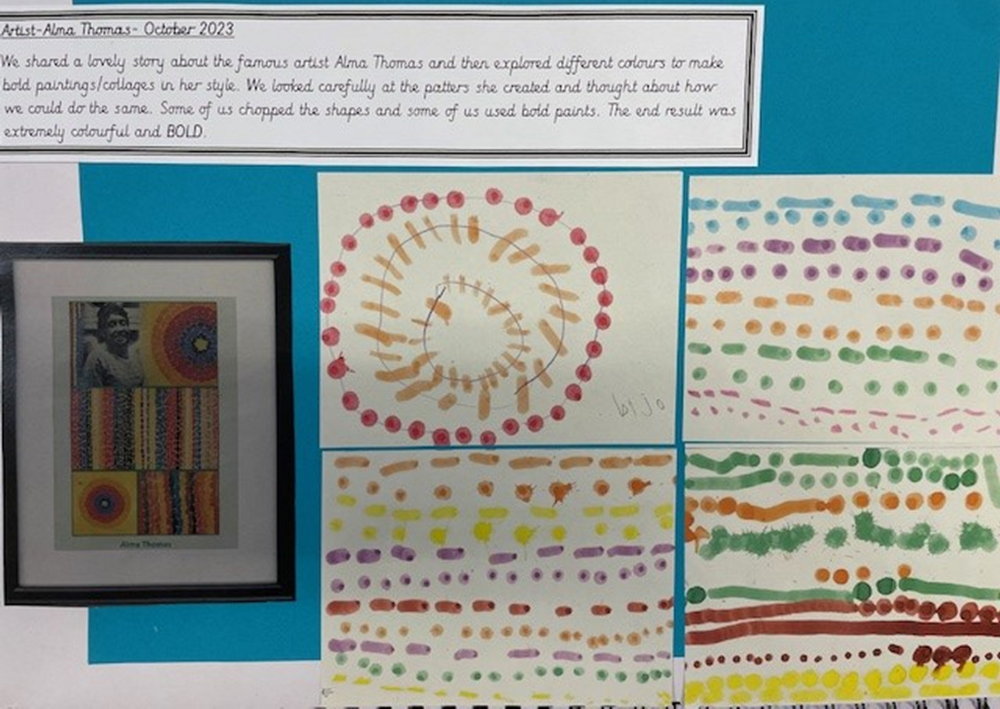 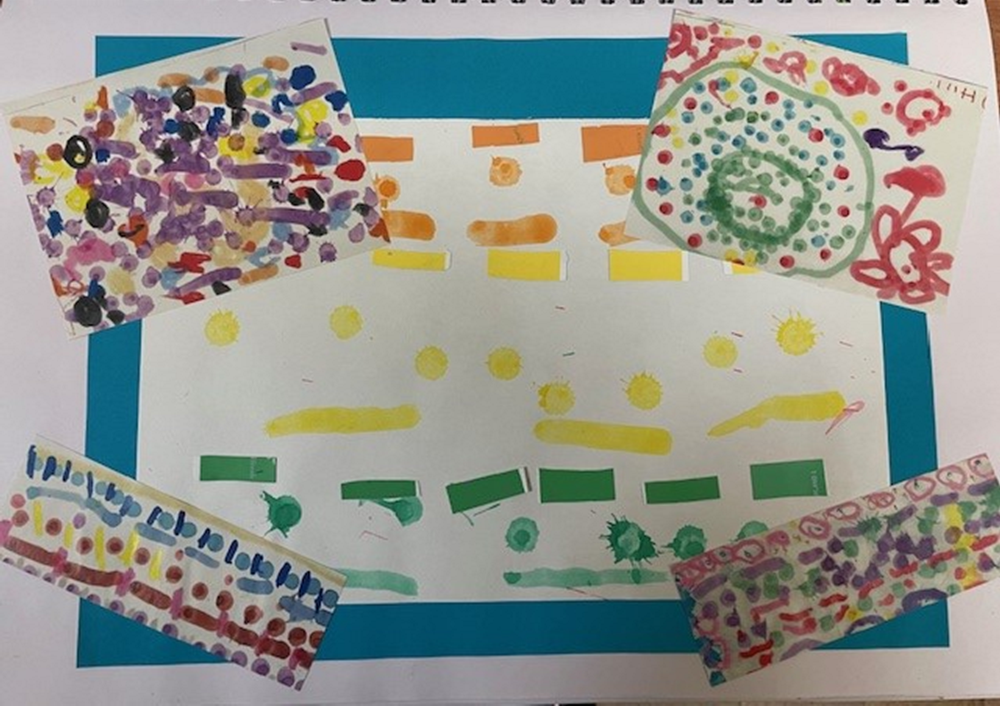 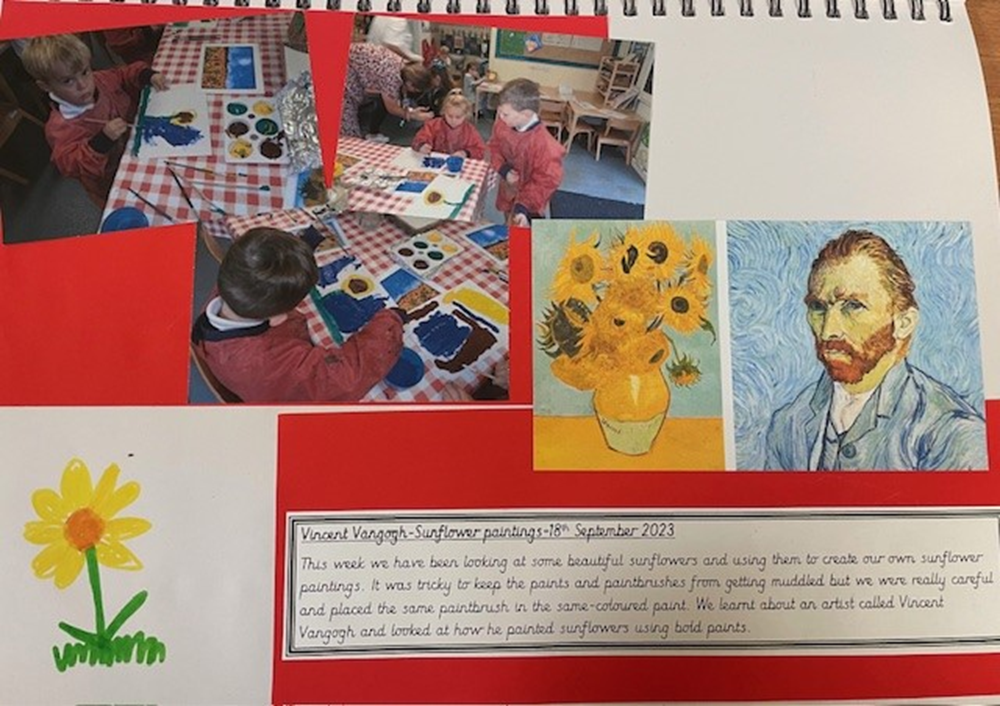
Play, our enabling environment and the importance of staff development
Play is essential for children’s development, building their confidence as they learn to explore, relate to others, set their own goals and solve problems. Play gives children choice and space to thrive. Children learn by leading their own play, and by taking part in play that is guided by adults. At St Nicholas at Wade CE Primary, we have worked hard over a number of years to ensure our curriculum has the right balance of teacher-led activities, teacher-initiated and child-initiated play. Careful modelling, scaffolding, discussion and questioning during play can lead to children engaging in sustained shared thinking with adults and their peers and the role adults have to play in play is vital. In light of this, we prioritise ensuring our staff have the skills they need to support pupil progress.
Our Characteristics of learning:
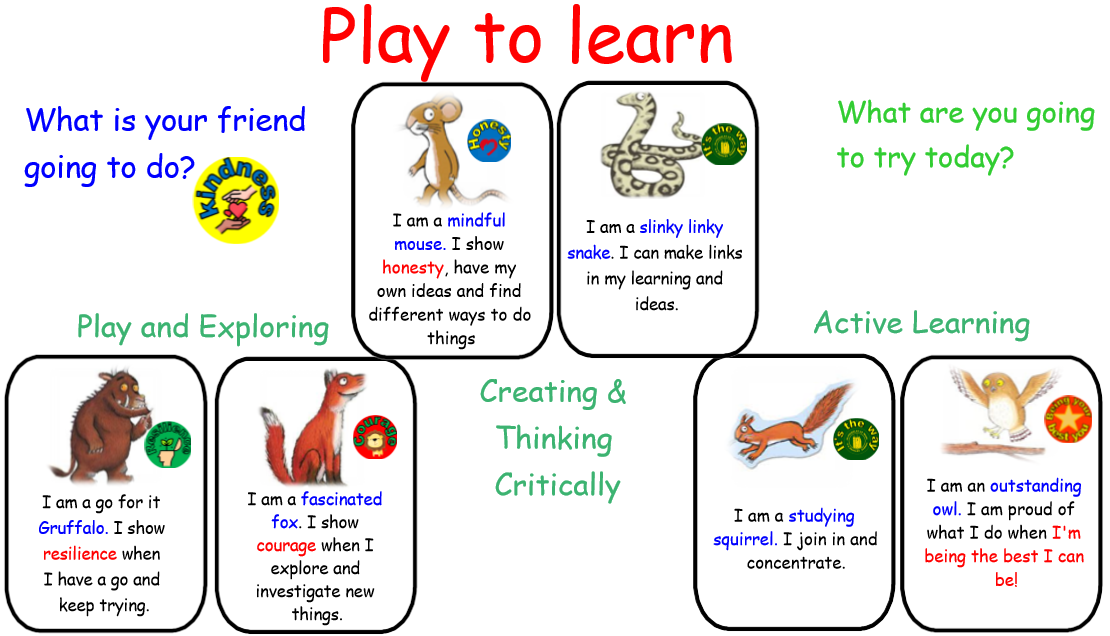
The best for every child
Every child is unique and every child deserves to have an equal chance of success. We believe it is important not to make negative assumptions about any pupils due to their background, and instead of doing this our aim is to ensure we get to know, value and understand every child and family that we teach. We see families as our partners in the development of their child and aim to foster positive working relationships with all our families from the moment they choose St Nicholas. Our school moto is ‘A place to belong, a place to grow’ and through our work with families, as well as our assessment and early intervention plans, we believe we can narrow the gaps any child in our care starts with. In line with this, at St Nicholas we ensure that our curriculum promotes and teaches both equality and diversity. We do this through the teaching of our values, celebrating and exploring the diversity of our families and of people around the world. Staff are also mindful of not exhibiting an unconscious bias, based on stereotypes that may affect our pupils.
In addition, we aim to remove any disadvantage faced by our pupils with special educational needs and/or disabilities. We do this by ensuring we spend time getting to know all our children and families, through regular assessment and intervention and through accessing and working with a wide variety of outside agencies.
Impact
|
The impact of our curriculum is to ensure children make better than expected progress from their varied starting points in every area of learning. We aim for all children to reach a ‘good level of development’ and consistently ensure the number of our children reaching the ‘GLD’ is above the national average.
The impact of our curriculum is also measured by how effectively it helps our children develop into well rounded individuals who embody our school values and carry with them the knowledge, skills and attitudes which will make them lifelong learners and valuable future citizens. We endeavour for our children to be ‘Key Stage 1 Ready’. Our children make strong progress academically, emotionally, creatively, socially and physically. Knowledge, understanding and skills are secured and embedded so that children attain highly and are fully prepared for their new year-group.
On entry to St Nicholas, all pupils will complete the Reception Baseline Assessment (RBA). Teachers will use this, alongside the knowledge they have gained about the children from parents, nursery provision and their own observations to make a baseline assessment of each child; indicting if they are on track or not in each area of learning.
Children’s progress is recording in individual learning journeys which is shared through Tapesty. These include photos, observations, assessments, children’s work and child and parent voice. Teachers will use their knowledge of the child to make further assessments at the middle and end of the year; allowing us to track progress. At the end of the year, teachers will use the Early Years Foundation Stage Profile to indicate if children have met the expected standard in each area of learning. Effective in and cross school moderation ensures these judgements are accurate.
|
|
|
|
|
